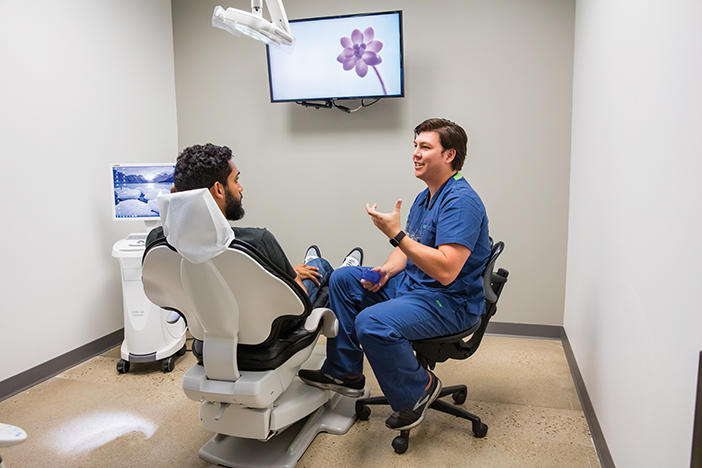The Unexpected Side of Sleep: Oral Health

You spend hours working out and eating well, but restful sleep is just as important for your health.
“A lot of patients are surprised when I ask them about their sleep during an exam. They have been going to the dentist their entire life and no one has mentioned these issues or the connection before,” says Vincent Ip, DDS of Smile 360 and a member of the Academy of Sports Dentistry. “A trained dentist in dental sleep medicine is often the first person to notice signs of a bigger problem, just through a simple exam.”
Oral health affects your overall wellness, and it’s important to know how sleep and dentistry are connected. Studies show that sleep disorders affect more than 60 percent of people. A lack of adequate sleep can affect mood, energy levels, weight and judgment. In the long term, chronic sleep deprivation may lead to many health problems including high blood pressure, obesity, diabetes, cardiovascular disease and even early mortality.
We often associate the letter “z” when referring to sleep. Ironically, ZZZs are not ideal as it is associated with sound that can be made with snoring during sleep. Snoring is not good for you — or your partner — so watch out for ZZZs with sleep and consult your dentist or sleep physician if you are having issues with snoring.
In order to better understand how sleep and oral health are connected, you need to know your ABC’s.
Airway has important effects on facial growth.
“It’s important to note that no one, and especially children, should sleep with their mouth open,” explains Dr. Ip.
There are two airways we can use: our mouth and nose. Most people don’t realize that mouth breathing is a complex health concern, however it is a habit that can be corrected with proper care. Mouth breathing is typically caused by chronic nasal obstruction. This is when your body can’t get enough oxygen by breathing through your nose, so it automatically resorts to your mouth. If you suffer from dry lips, crowded teeth, snoring, gum disease, bad breath or increased sinus and ear infections, you may be a mouth breather. Untreated mouth breathing is not only bad for your overall health, but over time, it can also lead to unpleasant changes in your facial appearance (i.e. wrinkles). Here are some factors that contribute to airway compression and potentially lead to long-term effects:
• Snoring
• Sleep apnea
• Lack of concentration
• Allergies or sinus problems
• Chronic sickness or swollen tonsils and adenoids
• “Allergic shiners”— dark circles under the eyes
• Long face
• Memory/Recall
Bruxism is a condition in which you grind, gnash or clench your teeth. Nighttime bruxism can cause dental damage, facial pain, premature aging and wrinkles and sleep disruption. If you are a nighttime bruxer, you may notice that you wake up with a dull headache, you never feel fully rested and your teeth look worn down.
“It is important to treat the source, not only the symptoms. Keeping the airway open is a great way to reduce bruxism at night,” Dr. Ip adds. “And wearing a proper appliance can help keep you better rested with a more youthful appearance.”
Continuous Positive Airway Pressure, or CPAP, is a therapy typically performed during the night that is used to treat obstructive sleep apnea by delivering constant and steady air pressure through a mask or nosepiece. Obstructive Sleep Apnea (OSA) is a serious life-threatening condition. Some or all of the conditions listed above may be an underlying sign of OSA. Your dentist may recommend a home sleep test in coordination with a sleep physician to diagnose. The most common treatment for sleep apnea is a CPAP machine to be worn at night. However, if you are diagnosed with mild to moderate apnea, or if you have tried and failed at CPAP therapy, you may consider a custom mandibular advancement device (MAD). The MAD positions your jaw forward to help you get a better airway and more restful sleep. If you are concerned you have sleep apnea, you should contact a dental professional right away to help you with treatment options.
If you are exhibiting signs or symptoms associated with any of these, get screened by a healthcare professional, such as your dentist, to find the right treatment customized for you.






